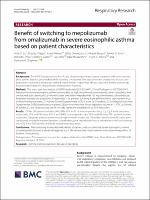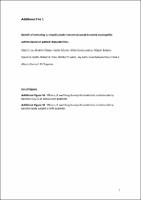| dc.contributor | Vall d'Hebron Barcelona Hospital Campus |
| dc.contributor.author | Liu, Mark C. |
| dc.contributor.author | Chipps, Bradley |
| dc.contributor.author | Muñoz Gall, Fco. Javier |
| dc.contributor.author | Devouassoux, Gilles |
| dc.contributor.author | Bergna, Miguel |
| dc.contributor.author | Smith, Steven G. |
| dc.date.accessioned | 2022-01-13T17:33:32Z |
| dc.date.available | 2022-01-13T17:33:32Z |
| dc.date.issued | 2021-05-10 |
| dc.identifier.citation | Liu MC, Chipps B, Munoz X, Devouassoux G, Bergna M, Smith SG, et al. Benefit of switching to mepolizumab from omalizumab in severe eosinophilic asthma based on patient characteristics. Respir Res. 2021 May 10;22:144. |
| dc.identifier.issn | 1465-993X |
| dc.identifier.uri | https://hdl.handle.net/11351/6793 |
| dc.description | Asthma; Asthma treatment; Eosinophils |
| dc.description.abstract | Background
The OSMO study assessed the efficacy of switching to mepolizumab in patients with severe eosinophilic asthma that was uncontrolled whilst receiving omalizumab. The objective of this analysis was to assess the proportion of patients achieving pre-defined improvements in up to four efficacy outcomes and the relationship between patient baseline characteristics and treatment response.
Methods
This was a post hoc analysis of OSMO study data (GSK ID:204471; ClinicalTrials.gov No. NCT02654145). Patients with severe eosinophilic asthma uncontrolled by high-dose inhaled corticosteroids, other controller(s) and omalizumab subcutaneously (≥ 4 months) were switched to mepolizumab 100 mg administered subcutaneously. Endpoints included the proportion of responders—i.e. patients achieving a pre-defined clinical improvement in ≥ 1 of the following outcomes: (1) Asthma Control Questionnaire (ACQ)-5 score (≥ 0.5-points), (2) St George’s Respiratory Questionnaire (SGRQ) total score (≥ 4-points), (3) pre-bronchodilator forced expiratory volume in 1s (FEV1; ≥ 100 mL), all at Week 32, and (4) annualised rate of clinically significant exacerbations (≥ 50% reduction).
Results
Of the 145 patients included, 94%, 83%, 63% and 31% were responders for ≥ 1, ≥ 2, ≥ 3 and 4 outcomes, respectively; 75% and 78% were ACQ-5 and SGRQ score responders, and 50% and 69% were FEV1 and exacerbation responders. Subgroup analyses demonstrated improvements irrespective of baseline blood eosinophil count, prior omalizumab treatment regimen/duration, comorbidities, prior exacerbation history, maintenance oral corticosteroid use, ACQ-5 and SGRQ scores, and body weight/body mass index.
Conclusions
After switching to mepolizumab, almost all patients with uncontrolled severe eosinophilic asthma on omalizumab achieved a beneficial response in ≥ 1 clinical outcome. Improvements were observed regardless of baseline characteristics. |
| dc.language.iso | eng |
| dc.publisher | BMC |
| dc.relation.ispartofseries | Respiratory Research;22 |
| dc.rights | Attribution 4.0 International |
| dc.rights.uri | http://creativecommons.org/licenses/by/4.0/ |
| dc.source | Scientia |
| dc.subject | Asma - Tractament |
| dc.subject | Eosinofília |
| dc.subject | Avaluació de resultats (Assistència sanitària) |
| dc.subject.mesh | Pulmonary Eosinophilia |
| dc.subject.mesh | /drug therapy |
| dc.subject.mesh | Drug Substitution |
| dc.subject.mesh | Treatment Outcome |
| dc.title | Benefit of switching to mepolizumab from omalizumab in severe eosinophilic asthma based on patient characteristics |
| dc.type | info:eu-repo/semantics/article |
| dc.identifier.doi | 10.1186/s12931-021-01733-9 |
| dc.subject.decs | eosinofilia pulmonar |
| dc.subject.decs | /farmacoterapia |
| dc.subject.decs | sustitución de medicamentos |
| dc.subject.decs | resultado del tratamiento |
| dc.relation.publishversion | https://doi.org/10.1186/s12931-021-01733-9 |
| dc.type.version | info:eu-repo/semantics/publishedVersion |
| dc.audience | Professionals |
| dc.contributor.organismes | Institut Català de la Salut |
| dc.contributor.authoraffiliation | [Liu MC] Divisions of Allergy and Clinical Immunology, Pulmonary and Critical Care Medicine, Johns Hopkins Asthma and Allergy Center, Baltimore, MD, USA. [Chipps B] Capital Allergy and Respiratory Disease Center, Sacramento, CA, USA. [Munoz X] Servei de Pneumologia, Vall d’Hebron Hospital Universitari, Barcelona, Spain. Ciber Enfermedades Respiratorias, Madrid, Spain. [Devouassoux G] Service de Pneumologie, Hôpital de la Croix Rousse, Hospices Civils de Lyon, UCB Lyon, Lyon, France. [Bergna M] Respiratory Research, CEMER, Vicente Lopez, Buenos Aires, Argentina. [Smith SG] Respiratory Therapeutic Area, GSK, Research Triangle Park, NC, USA |
| dc.identifier.pmid | 33971856 |
| dc.identifier.wos | 000656440500002 |
| dc.rights.accessrights | info:eu-repo/semantics/openAccess |


